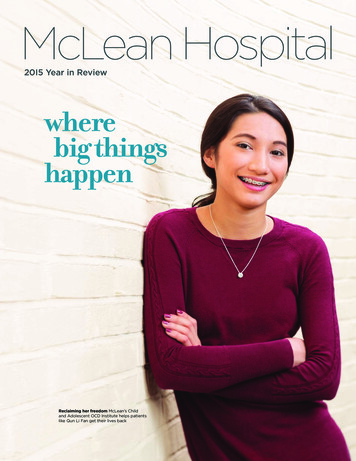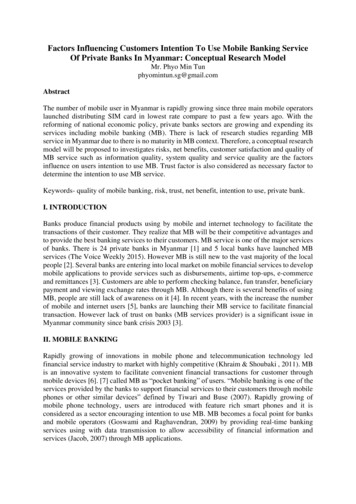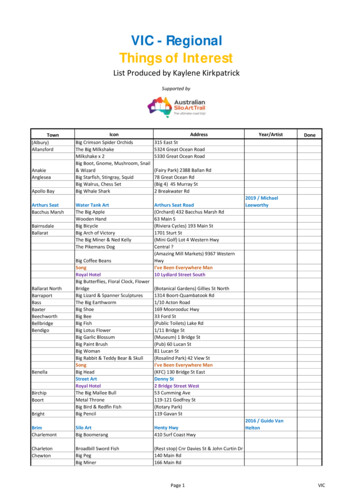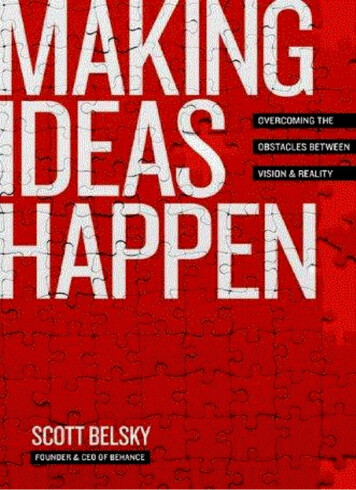
Transcription
McLean Hospital20I5 Year in Reviewwherebig thingshappenReclaiming her freedom McLean’s Childand Adolescent OCD Institute helps patientslike Qun Li Fan get their lives back
McLean Hospital2» Allen Schiller, PhD, andCathy McCool, LICSW, ofMcLean’s premier evaluationand diagnosis program,The PavilionOur MissionMcLean Hospital is dedicated to improving the lives of people and familiesaffected by psychiatric illness. McLean pursues this mission by: Providing the highest quality compassionate, specialized and effective clinical care,in partnership with those whom we serve; Conducting state-of-the-art scientific investigation to maximize discovery andaccelerate translation of findings towards achieving prevention and cures; Training the next generation of leaders in psychiatry, mental health and neuroscience; Providing public education to facilitate enlightened policy and eliminate stigma.
32015 Year in Review2015 Year in Review420Welcome: Message from the Presidentand Chairman of the BoardMcLean-China collaboration: Crossingborders to make a global impact622A new home for hope: ObsessiveCompulsive Disorder Institute achievesbig results for young patientsIn the seat of learning: Sharing knowledgeto advance the mission8A new tool for treatment: Creativelycapturing patients’ feelingsA passion for science and collaboration:Moving discoveries from the lab to the clinic112324LEADER program: Helping everyday heroesLeading the way: Bringing the McLeanmission to life1225Fighting depression: Exploring two fastgrowing, effective treatment approachesMarijuana and the brain: First-of-its-kindstudy uncovers marijuana mysteries14PLUSPhilanthropy: Realizing a dream, then givingback in appreciation15Campaign for McLean Hospital1626Broadening the reach: Leading key healthcare reform initiatives2015 Financials18McLean Leadership/By the Numbers27The neuroscience interpreter: Expandinginsight into the adolescent brainExecutive Editor: Adriana M. Bobinchock n Managing Editors: Scott J. O’Brien and Melissa Daroffand Ruthann Baler n Principal Photographer: Patrick O’Connor n Design: Steve Close CreativenWriters: Adriana M. Bobinchock 2016 McLean Hospital
McLean Hospital4«Scott L. Rauch, MD, presidentand psychiatrist in chief (left),and David S. Barlow, chairmanof the board
5 52015 Year in Review2015 Year in ReviewDear Friends,“I can’t say enough about the people atMcLean and how supportive they’ve been.”The quote above came from Elizabeth See, a formertennis professional who has struggled with depressionfor more than a decade. As you will read in this issue ofYear in Review, Elizabeth finally experienced improvement thanks to transcranial magnetic stimulation—a treatment she receives at McLean in our newlyexpanded Psychiatric Neurotherapeutics Program.We are proud to say that Elizabeth is only one of themany people who have been positively affected byMcLean Hospital’s recent growth.In 2015, we made great strides in developing, expanding, and launching programs that provide greateraccess to high-quality, evidence-based, compassionatepsychiatric care, while also emphasizing the need andimportance of innovative research and exceptionaleducational experiences for professionals and thegeneral public.In the pages of this magazine, you will see that “BigThings” are indeed happening across all of McLean’scampuses, including the announcement of the largestphilanthropic effort in hospital history. We are wellon our way toward meeting our fundraising goal of 100 million, which will enable us to more fully realizeour vision of improved access to care and accelerateddiscovery, hopefully leading to prevention and cures.Other “Big Things” that we are excited to highlight: the launch of the Child and Adolescent ObsessiveCompulsive Disorder (OCD) Institute, which wasmodeled after our world-renowned adult OCDtreatment program. Since opening last spring,this new program—affectionately known asOCDI Jr.—has drawn families from around theglobe seeking expert care for their children. the recruitment of Kerry J. Ressler, MD, PhD, whois spearheading the growth of McLean’s researchprograms as our new chief scientific officer andchief of the Division of Depression and AnxietyDisorders. With a vision of cross-collaboration,he is fostering translational research by helpingMcLean’s scientists and clinicians join in thisquest more seamlessly. the growth of our LEADER (Law Enforcement,Active Duty, Emergency Responder) program,which provides specialized mental health andaddiction services for men and women in uniform, including police officers, fire departmentpersonnel, and active members of the military.This past year has been full of triumphs for our hospital,our faculty and staff, and our patients and their families.We are energized by the work we have done over thepast 12 months to improve the lives of others andlook forward to our continued success in the comingyear—together making critical strides and surmountingimportant challenges that lie ahead.Best wishes,Scott L. Rauch, MDDavid S. BarlowPresident and Psychiatrist in ChiefRose-Marie and Eijk van Otterloo Chair of PsychiatryChairman of the Board of Trustees
McLean Hospital6
7freedomFor 14-year-old Qun Li Fan, who liveswith obsessive compulsive disorder(OCD), freedom has a meaning all its own.The freedom to participate in everydayactivities—such as going to school, playingher violin, or even sleeping in her ownbed—was taken away by this disorder.Fan has a type of OCD called emotional contamination,in which she feels that by coming into contact withcertain feared or unwanted objects, places, or people,she will become contaminated by them. This resultedin an excruciating level of anxiety, according to Lisa W.Coyne, PhD, director of McLean’s Child and AdolescentOCD Institute (OCDI) at McLean SouthEast inMiddleborough, Massachusetts.“When she was nine, Qun Li began having symptomsthat continued to worsen over time. She would get soanxious she would have what she called ‘rage attacks’—which were a mix of feeling incredibly anxious, angry, andscared—where she would just feel out of control,” saidCoyne. “These episodes were happening almost daily,and she was in a place where she could no longer attendschool. She felt like her house was contaminated, andshe was no longer able to go into her own room, wear herclothes, or even touch her dog that she loves.” In March2015, she had to be taken to the emergency room.“She was very trapped in her own life, and a lot of kids whocome to us are in exactly that place,” said Coyne. “QunLi came to us in August 2015 and needed an intensive,residential treatment program. The staff started workingwith her to do exposure and response prevention therapy, which is an evidence-based behavioral treatmentapproach. We did a lot of work around all the things herstruggle with OCD has taken away from her and that shewanted back.”After a few months of treatment, Fan was eventuallywilling to go home on the weekends, staying in touchwith the Child and Adolescent OCDI staff via video chatto help her continue her therapy at home. “Slowly, shewas able to feel comfortable in every room of her house,”said Coyne.November 20, 2015, was Fan’s last day at the Child andAdolescent OCDI. The staff worked with her family toarrange for outpatient therapy and to develop a plan fortransitioning Fan back to school.Fan said she encourages other teens who struggle withOCD to focus on their future goals and what they reallywant back in their lives. “Imagine your life without OCDand realize that you can make that happen. I wouldencourage them to take a step in the right direction,because no matter how tiny that step is, it will help themand they will thank themselves in the future.”Kelly Fan, Qun Li’s mother, said, “When you see your childnot being able to do the most simple tasks, everythingcomes to a complete stop. I can’t put into words whatMcLean has done for her and for us—to see her be able tonow possess the tools that she so desperately needed inconquering OCD. I see McLean as clearly saving her life.”The Child and Adolescent OCDI, which opened in March2015, is operating at full capacity and providing treatment to children and teens locally and from as far awayas Mexico, Zurich, and Montreal, said Coyne, adding that1 to 2 percent of children and teens in the United Stateslive with OCD. “We have an extensive waiting list andthe need for our kind of services is huge. We are reallylooking forward to a time when we can grow our programto have more beds to serve more kids.”«L isa W. Coyne, PhD, director of McLean’s Child and Adolescent OCD Institute (left), with Qun Li Fan2015 Year in ReviewReclaiming her
McLean Hospital8a passion forSCIENCEandCOLLABORATIONStanding well over six feet tall, with a hearty smile and disarming laugh, Kerry J. Ressler, MD, PhD,commands a room as he talks about his vision for advancing translational research to improve thehealth and well-being of patients, particularly in psychiatric care.And when Ressler speaks, it is clear that his work is as much a part of him as his slight southerndrawl. He’s clearly excited about what he does and—by the end of a conversation with him—so iseveryone else.“I’ve always been passionate about combining our understanding of neuroscience and biologywith behavior,” said Ressler, who holds a bachelor’s degree in molecular biology from theMassachusetts Institute of Technology, a medical degree from Harvard Medical School, and a PhDin neuroscience from Harvard University.Joining McLean Hospital as its chief scientific officer and chief of the Division of Depressionand Anxiety Disorders in August 2015, Ressler is focused on building translational efforts acrossresearch and clinical work, which may have the best possibility of changing how we understandand develop new treatments and preventions for psychiatric disorders.“I wanted to pursue both research and clinical work because they are equally fascinating but quitedifferent. With neuroscience research relying on logical problem solving and psychiatry involvingmuch more of the art of medicine, the combination of both allows one to see the direct impact onpeople’s lives,” he said.What drew Ressler to McLean was the opportunity to be part of the “best clinical psychiatricprogram in the country, and probably the world, and its outstanding, cutting-edge researchprogram,” he said.Continued on next page» Opposite page, from left: Jordan Walton, Kerry J. Ressler, MD, PhD, chief scientific officer,and Teniel Ramikie, PhD, of McLean’s Neurobiology of Fear Laboratory
92015 Year in Review
McLean Hospital10The fact that McLean’s basic and clinical research takesplace on the same campus as its treatment programs—unlike many other research operations—was anotherhuge draw.“I’ve spent my career doing translational research,from bench to bedside and back again. I see my chargeat McLean as fostering further translation by helpingthe clinicians intersect with the basic scientistsand vice versa,” said Ressler. “Coming herehas offered me an opportunity to workat a place that has world-class science and clinicalresearch programs and renowned experts in clinicaldisorders. With the goal of doing translational researchand helping to move science to the clinic, there is nobetter place than McLean.”As one of the country’s leading experts onthe neurobiology of trauma, Ressler—who also directs the Neurobiologyof Fear Laboratory—finds himselfexcited about the prospect ofenhancing his work throughjoint ventures with hisMcLean and Harvard MedicalSchool colleagues.“The focus of my research is on how fearworks and how we can improve the treatmentand prevention of such disorders as PTSD, phobias, panic, and other anxiety disorders,” explainedRessler. “This is very synergetic with the work that isbeing conducted throughout McLean and—throughpartnerships with people like William Carlezon, PhD,Vadim Bolshakov, PhD, Diego Pizzagalli, PhD, andothers—there is great potential for us to make enormousprogress.”Progress is something Ressler never loses sight of,whether in the lab or in his administrative roles. As thehospital’s inaugural chief of the Division of Depressionand Anxiety Disorders, he is working to improvecommunication and collaboration across the division’sclinical and research operations.“These are programs that are truly outstanding andall share similar goals and processes—yet they havehistorically existed on their own,” he said. “If wecan better take advantage of combined resources,faculty expertise, and research infrastructure, we willaccomplish great things together by introducing ouraggregated knowledge into our clinical practices andresearch programs.”Thanks to a gift from longtime McLean supporters,Ressler holds the James and Patricia Poitras EndowedChair in Psychiatry.« Looking closely at how the brain affects fearand anxiety behaviors
112015 Year in ReviewHelping Those in the Line of DutyThe LEADER (Law Enforcement, Active Duty, EmergencyResponder) program has grown substantially in volume and scopesince it was launched in 2013 following the Boston Marathonbombing, according to McLean’s Chief Medical Officer JosephGold, MD, who oversees LEADER across multiple clinicaldivisions and levels of care. Gold noted that McLean developedthe initial pilot for LEADER thanks to a generous gift fromThe Patriots’ Day Project of Fidelity Investments Employees.Created to provide specialized mental health and addictionservices for men and women in uniform, including police officers,fire department personnel, active members of the military, andother first responders, LEADER is one of the few programs of itskind in the United States.“We understand that police officers, firefighters, EMTs, and otherfirst responders face unique and often overwhelming stress inthe type of work they do, and at the same time they may also faceobstacles in seeking help,” said Gold, who outlined how LEADERhas grown since its inception. There have been more than 300 inpatient admissionssince the program started. Utilization of the men’s LEADER residence averages10 admissions per month. The outpatient LEADER trauma recovery program,launched in 2015, has already had more than 500patient visits.“There are other programs across the country that providesimilar services, but to our knowledge, what we offer is unprecedented and comprehensive in size, scope, and gender-specifictreatment. LEADER patients have access to McLean’s highlyspecialized programs for every type of psychiatric condition,”explained Gold.
McLean Hospital12FIGHTINGDEPRESSIONTMS AND ECT ARE INCREASINGLY SOUGHT-AFTER TREATMENTSFOR DEPRESSION AND OTHER MENTAL ILLNESSESElizabeth See struggled with depression for more than a decadewhen, in November 2014, she was diagnosed with Goodpasturesyndrome, a rare autoimmune disease that attacks the kidneysand lungs. A tennis professional, she suddenly found herlivelihood and passion restricted by physical constraints andregular dialysis treatments.Her depression worsened, causing her to stop participating ineveryday activities. Some days, she didn’t want to eat or talk tofamily or friends. When she first heard about transcranial magneticstimulation (TMS), “I was at a point where I had nothing to lose,”she said, “but after the fifth treatment, the light shined through. Itwas an extraordinary thing to begin feeling like myself again.”Oscar G. Morales, MD, associate director of McLean’s PsychiatricNeurotherapeutics Program (PNP) and director of the TMSService, said that See’s experience is typical for those who undergoTMS treatments.“An estimated 20 to 40 percent of patients who live with severedepression do not benefit adequately from such interventions asmedications and psychotherapy, yet they have great success withTMS,” said Morales. “TMS has proven to be both safe and effective,with patients experiencing positive outcomes after several weeksof treatment.”In 2014, a generous anonymous donor made it possible forMcLean to acquire a deep TMS device, thus expanding the
132015 Year in ReviewStaff of the PNP provide compassionate care, ensuring that patients are comfortable and responding well following treatmenthospital’s offerings for those with severe depression. Theanonymous donor followed up in 2015 with an additional giftto further strengthen McLean’s TMS program.the increased availability of accurate information online and inthe media, and the increased awareness through physician officesand hospitals.Like See, an increasing number of people who struggle withdepression or other psychiatric diagnoses are seeking out TMSor electroconvulsive therapy (ECT) to address their disorderswithout—or with a reduced need for—medication. While TMSis used for severe depression—especiallyfor those who do not respond well tomedication—ECT is a highly effectiveintervention for chronic depression,mania, and schizophrenia.“As patients get better, they and their doctors refer more peopleto our services,” explained Seiner, who noted another reason foran increase in demand has been the program’s reputation forits expertise. “We’re a passionate group of people committed tohelping the most profoundly depressed andill patients in psychiatry.”Both TMS and ECT, which are part of thehospital’s PNP, have become successfultreatments for patients, according toStephen J. Seiner, MD, director of the PNPand medical director of the ECT Service.“I CAN’T SAYENOUGH ABOUTTHE PEOPLE ATMcLEAN AND HOWSUPPORTIVE THEYHAVE BEEN.”“Over the past 10 to 15 years, there hasbeen a strong demand for ECT and we’vebeen working to continuously meet that demand,” said Seiner.“We’re providing about three to four times the treatments wewere doing previously, which is now about 10,000 treatments peryear—making us one of the largest ECT centers in the country.We remain on the cutting edge of the latest advances in ECT andTMS, and more recently, deep TMS.”There are several reasons why more people are choosing ECTand TMS to address their illnesses, he said, including the highsuccess of the treatments, the reduced stigma of mental illness,In early 2015, the ECT and TMS suite movedto a new location on the Belmont campus,which made it possible to increase capacityand better accommodate patients.“When we started offering TMS in 2008,we were providing six to eight treatmentsa day, and now that number has more thandoubled,” said Paula Bolton, MS, APRNBC, program director. “We’re continuallytrying to meet the demand in a way that isboth feasible, in terms of running the program, and truly patientcentered,” said Bolton. “It’s all about the patient. We customizetreatment so each patient feels like they’re getting the attentionthat they need.”Like many patients, See feels fortunate to have heard about TMSwhen she did. “I can’t say enough about the people at McLean andhow supportive they have been,” she said. “I was actually able tolook at the sunset the other day and really appreciate it and begrateful I was alive.”
McLean Hospital14DREAMSREALLY CAN COME TRUESHARE YOUR GREATEST DREAM.EVEN IF YOU ARE SURE IT WON’T COME TRUE.Most of us would give pause to such a request,but for Thomas J. Swan III, it was especiallydaunting. The request was posed by his treatmentteam at McLean’s Fernside program, whichprovides intensive residential treatment for adultswith complex substance use and co-occurringpsychiatric conditions.
“THE ADDICTIONDESTROYED EVERYTHINGOF VALUE IN MY LIFE.”Swan’s dream was tohave a family of hisown. But given thathe was single, gay, and living with HIV, he could notimagine it coming true.That exercise and the work Swan did at Fernside provedto be a turning point. It was the first time he was able tobe honest about his sexuality and addiction, and beginthe process of accepting himself.From the outside, one would not have guessedSwan’s struggles. A graduate of Harvard College andGeorgetown Law School, Swan was by all measuressuccessful. Over more than a decade, he practiced lawand worked in investment banking, ultimately becominga principal with a West Coast firm. While his externalachievements masked the internal shame and stigma hefelt over being gay, eventually the substances he used todeal with his pain led him into full-blown addiction. Hecame to Fernside seeking help for alcoholism, addiction,and anxiety-induced panic attacks.“The addiction destroyed everything of value in my life,”he said. “But it was my way of dealing with being gay in aworld where I was expected not to be. I thought it mademe worthless and unlovable. I was sure it disqualified mefrom being a parent. And if it did not, then the collateraldamage of my addiction certainly did. That is how I cameto be hopeless. And that is what changed at McLean.”There was only one other person to whom Swan had toldthis dream: his father, Thomas J. Swan Jr., a McLeantrustee from 2005 until his death in 2011. Unbeknownstto Swan, his father researched the medical facts andlearned that recent breakthroughs in science had madeit possible and safe for a person who was HIV-positive tobecome a biological parent without risk of transmittingthe virus to the child or surrogate.“My dad took it on himself to learn about this and wassupported in his efforts by the people he knew andworked with at McLean,” Swan said. “In his final month,my dad, who was my best friend throughout my life andwho had the greatest influence on me, encouraged meto pursue two things:a leadership role inour family businessand my dream of having my own children.”That’s when Swan knew that, with his father’s supportand McLean’s help, maybe his dream could come true.“I set conditions for myself: sustained recovery fromaddiction, taking good care of myself physically andmentally, and getting back to work,” he said. “When Ihad accomplished those goals and truly put my life backin good order, I could take the next step.”So Swan began focusing on the family business andtoday, together with his cousin, he is following inhis father’s footsteps running a group of businesseswith manufacturing facilities in Asia, North America,and Europe that sell products in almost every part ofthe world.He also resolved to strengthen his physical well-being.He ran the New York City Marathon in 2014 and twicecompleted a 545-mile bike ride from San Francisco toLos Angeles.Then he embarked on creating a family, and in January2015, Swan’s healthy, biological son and daughter—Samand Rosie—were born.“The only reason this was possible was because thatexercise at Fernside made me believe that my dreamcould come true after all,” he said. “That, and theunconditional love and support from my mum anddad. And as dedicated and passionate as I am aboutwork, it does not compare to the joy of being Sam andRosie’s dad.”Swan also has followed in his father’s footsteps in hisphilanthropic support and service to McLean. He givesgenerously to McLean each year through the MaryBelknap Society and made a substantial gift to McLean’s 100 million comprehensive campaign. He also serveson McLean’s National Council, a group of donors who actas ambassadors for the hospital. “I give back to McLeanbecause I am grateful,” he said. “After all, it was McLeanthat enabled my greatest dream to come true.”« McLean National Council and Mary Belknap Society member Thomas J. Swan IIIwith his children Rosie (left) and Sam
15In October 2015, McLean Hospital publicly announced its 100 million Campaignfor McLean Hospital—the largest and most ambitious in the hospital’s history.With the leadership phase launching in 2012, McLean’s closest supporters wereeager to participate, contributing 85 million before the campaign was formallyannounced. By the end of 2015, the campaign reached 94 million—just 6 millionshy of its goal. 100M GoalRaised to Date(December 31, 2015) 94,259,419“The response to this campaign has been phenomenal,” said Campaign Co-Chair andformer Chair of McLean’s Board of Trustees Kathleen Feldstein, PhD. “It is heartwarming that so many people have made gifts across the full breadth of McLean’smission. This support is a powerful endorsement of McLean’s role as a leader in thefield as it strives to address the many challenges in psychiatry and mental health.”The campaign is currently making strategic investments in the future of McLean.A primary focus of the effort has been to establish seven Centers of Excellence inpsychotic disorders, depression and anxiety disorders, substance use disorders,child and adolescent psychiatry, geriatric psychiatry, women’s mental health, andbasic neuroscience.In addition, the Campaign for McLean Hospital seeks resources to attract andsupport world-class leaders, to advance research, and to optimize patient outcomes.“Thanks to our generous community of donors, we have launched all seven of ourCenters of Excellence, welcomed outstanding new talent, seeded new clinicalprograms, supported novel research, and made tremendous strides in our strategicdirection,” said Scott L. Rauch, MD, president and psychiatrist in chief. “Thecampaign goal is within reach and meeting it will enable us to more fully realizeour vision of improved access to care and accelerated discovery, one day leading toprevention and cures.”Ways to GiveClinical Programsand Research 56,307,045Endowment 24,324,594Every year, donors like you make a difference in the lives of people affectedby psychiatric illness.Annual Giving (Mary Belknap Society) Unrestricted gifts support a rangeof programs and help launch initiatives. A gift of 1,000 or more qualifies youfor membership in the Mary Belknap Society.Targeted Giving Whether you choose to give toward a research fellowship, acapital project, or clinical care, you can target your gift to the program that ismost meaningful to you.Tribute Giving A tribute gift to McLean is a way to honor a loved one, thanka caregiver, or celebrate a milestone.Legacy Giving (John McLean Society) You can leave a lasting legacy throughyour estate plan or by joining the John McLean Society.To learn more or to give to McLean today, visit mcleanhospital.org/giveor contact:McLean Hospital Development Office115 Mill Street, Belmont, MA 02478phone: 617.855.3415 email: McLeanDevelopment@partners.orgBuildings andEquipment 8,785,654Annual UnrestrictedSupport 2,940,516Other 1,901,6102015 Year in ReviewThe Largest FundraisingEffort in Hospital History
McLean Hospital16“ FOR TOO LONGTHERE HAVE BEENSILOS IN OUR HEALTHCARE WORLD WHEREMENTAL HEALTH ANDNON-MENTAL HEALTHISSUES HAVE BEENSEPARATED.”Brent P. Forester, MD, MSc
17PARTNERS-SHIPLeading Key Health CareReform Initiatives for McLeanand Partners HealthCareAs an avid runner and diehard Red Sox fan, BrentP. Forester, MD, MSc, is no stranger to challenges.It was no surprise when he was asked, in 2015,to take on two taxing but critical roles—chief ofthe Division of Geriatric Psychiatry at McLeanHospital and medical director for BehavioralHealth within Population Health Management atPartners HealthCare—that he eagerly said yes.During his first day on the job at Partners, Foresterwas presented with his task: spearhead initiativesthat are designed to provide better patient care andreduce medical costs.“A significant health care challenge in ourcountry now is something that Population HealthManagement directly addresses,” he said. “Howshould we identify and treat mental healthproblems in patients treated within primary caresettings in a way that is both high-quality andcost-effective?”At McLean, Forester is helping to address themental health challenges of older adults who areliving with mood disorders and other psychiatricillnesses, and also those with neurocognitivedisorders, such as Alzheimer’s disease.He pointed out that by the time many of thesepatients come to McLean, they are seeking secondor third opinions. “We want to diagnose peopleearlier, not only to help identify and treat what isfunctionally impairing and adversely impactingquality of life, but what is also really ratchetingup overall health care costs.”Forester’s work at McLean falls nicely in line withhis new role at Partners HealthCare, where heis also leading a comprehensive clinical serviceprogram—a collaborative care model—to integratebehavioral health services into primary care acrossmore than 190 member practice settings.The goals of the behavioral health integrationprogram at Partners include screening fordepression at the primary care level and facilitatingpatient referrals to the appropriate resources.“We’ve rolled out collaborative care to about 40practices and we hope by the end of the year we’llbe in about one-third of all practices across thePartners network,” said Forester.This venture gives clinicians in the mental healthfield an opportunity to both help design whatbehavioral health care should look like and workwith colleagues in the primary care setting.“For example, when you have a patient withdiabetes or heart disease, the treatment is fairlystraightforward and the outcomes are fairlypredictable. Now, if that same patient also hasdepression, it gets more complex. The overallmedical outcomes are worse, and becausedepression is more challenging to treat, the costsrise significantly,” explained Forester.Added Forester, “by treating psychiatric illnesseswhen they occur in the context of patients’ medicalproblems, outcomes can improve.”2015 Year in ReviewHOW TO BUILD A STRONG
McLean Hospital18the ESSENCE ofADOLESCENCEWhen Marisa M. Silveri, PhD, director of McLean Hospital’sNeurodevelopmental Laboratory on Addictions andMental Health, gives community presentations on themultimodal approach. We’re not justeffects of alcohol and drug use on the adolescent brain,looking at one endpoint—we conductshe refers to herself as a “neuroscience interpreter.”thorough, comprehensive, and specific.our research to make the results moreThis gives us increased precision toSpeaking to hundreds of students,young adults, measured using magneticparents,better underst
with obsessive compulsive disorder (OCD), freedom has a meaning all its own. The freedom to participate in everyday activities—such as going to school, playing her violin, or even sleeping in her own bed—was taken away by this disorder. Fan has a type of OCD called emotional contamina




![IN THE SUPREME COURT OF T]-lE STATE OF MONTANA](/img/7/526b198c923f8.jpg)





